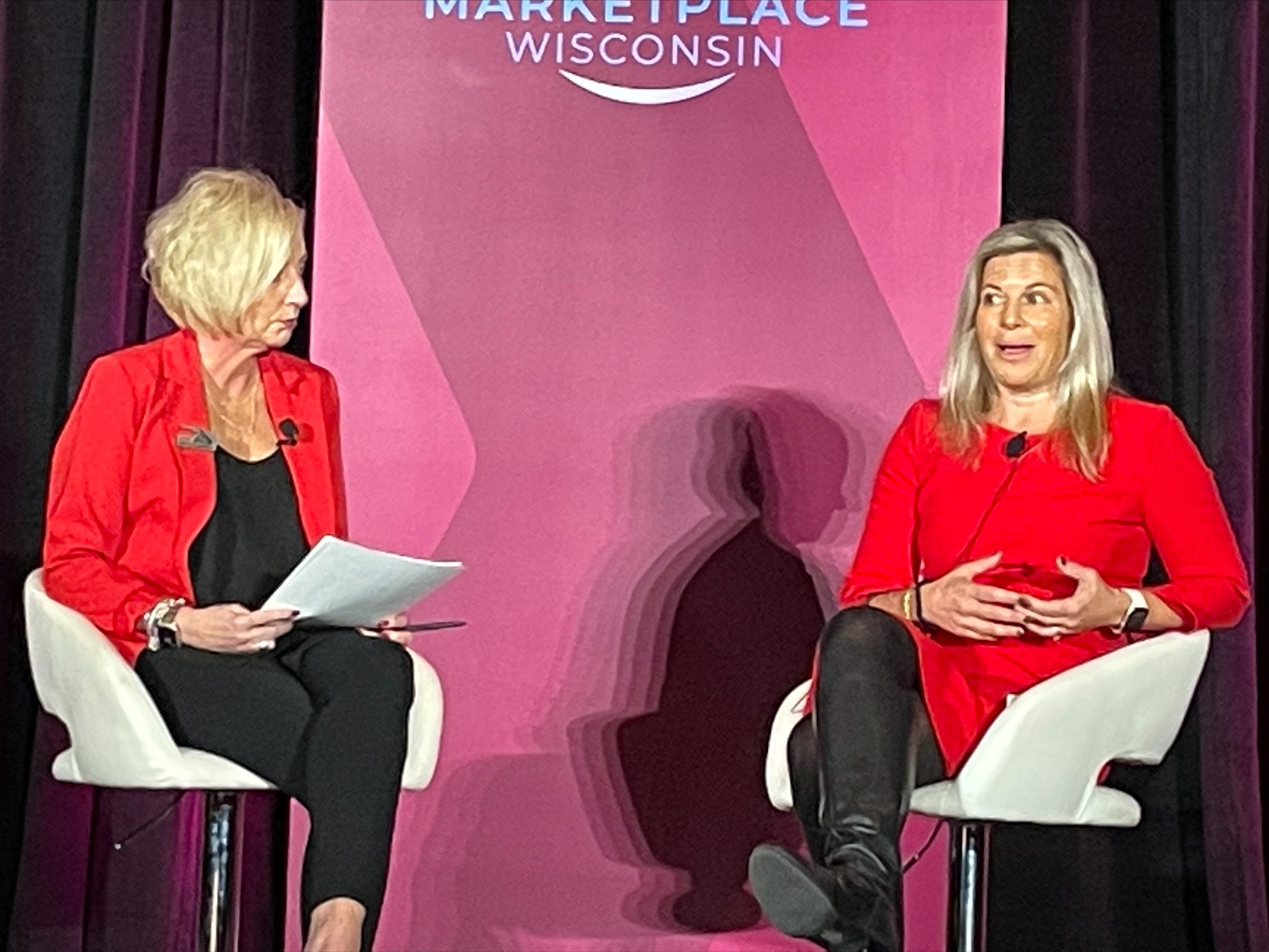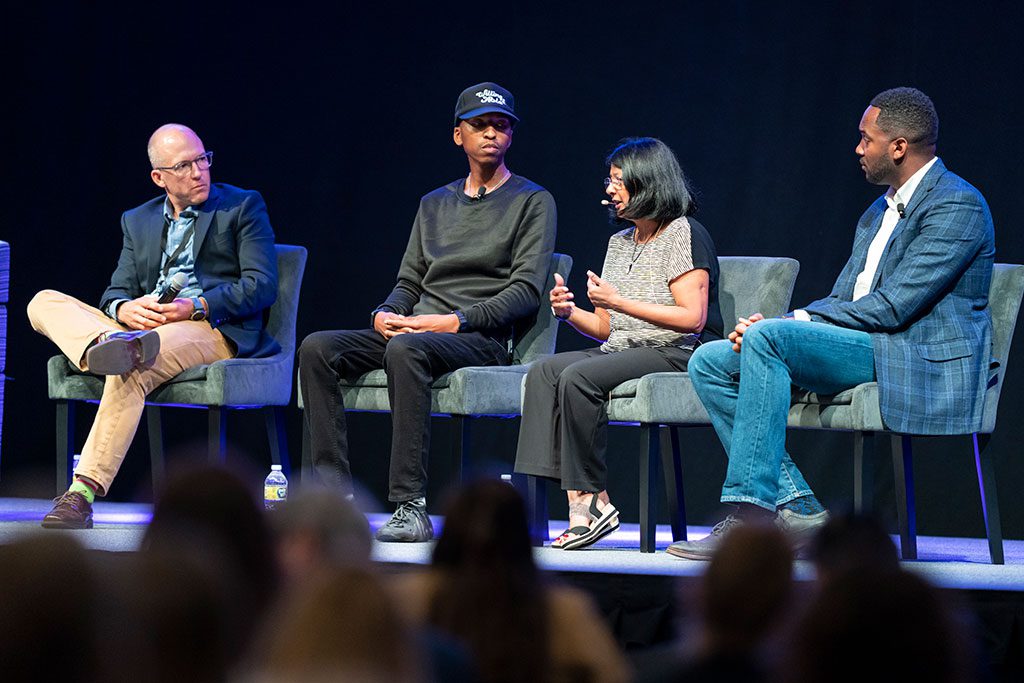
School of Freshwater Sciences Dean Val Klump (center) talks about freshwater ecology on Lake Michigan with Governor Tony Evers during a tour of the R/V Neeskay in August 2019. At left is UW-Milwaukee Chancellor Mark Mone.
With more than 50 different water-focused degree programs at educational institutions across the state, Wisconsin has a wealth of educational resources for students who want to delve into solving the world’s water challenges.
Now, a new initiative aims to coordinate those efforts across the state’s public institutions of higher education, enabling both improved collaboration and increased specialization as each institution further develops its areas of expertise.
The Freshwater Collaborative spans all 13 University of Wisconsin System institutions. It is designed to develop the workforce Wisconsin’s water technology sector needs and solidify Wisconsin’s leadership in the field. Initial funding for the program is coming from a $670,000 grant from WEDC and $1.4 million from the UW System.
“The Freshwater Collaborative of Wisconsin will attract local, regional and global talent to Wisconsin, helping make us the Silicon Valley of water,” said UW System President Ray Cross. “It is another example of how invaluable the UW System is, and how our campuses are meeting the needs of Wisconsin and the nation.”
Wisconsin is home to more than 230 companies with ties to the water technology industry; these companies together employ more than 23,000 people and generate $15.7 billion in annual sales. The state’s strength in water technology was showcased this week at the Water Environment Federation’s Technical Exhibition and Conference (WEFTEC) in Chicago, with many Wisconsin companies exhibiting and representatives of WEDC and The Water Council being featured in multiple presentations as part of the program.
Led by UW-Milwaukee, the Freshwater Collaborative has set a goal of addressing 10 “grand water challenges” in Wisconsin and the world, with a consortium of campuses working together to address each challenge. The collaborative aims to better focus the state’s existing resources on solving urgent problems, and to help address the state’s workforce challenges through talent development. Its goals also include drawing out-of-state students and faculty and attracting additional research funding to Wisconsin. Projections call for an additional 1,000 undergraduates and 400 graduate research students to be studying in water science fields by 2025.
Wisconsin is also addressing water challenges—and workforce challenges—at the K-12 level. The state Department of Public Instruction has announced that water will be the theme of its “statewide inquiry experience” that spans the period 2019-2024. Designed to connect classroom learning to real-world problems, the initiative includes resources for teachers and statewide events including an official kickoff at the Wisconsin Science Festival.
Leveraging educational resources to solve real-world challenges is a top priority of Governor Tony Evers, who visited the School of Freshwater Sciences at UW-Milwaukee to learn about the Freshwater Collaborative last month.
While there, Evers visited the research labs of:
- Sandra McLellan, who studies the impact of human influence on freshwater ecosystems in urban coastal areas (e.g., contamination of beaches or drinking water from pathogens in sewage and stormwater runoff);
- Rebecca Klaper, director of the Great Lakes Genomics Center, who studies the impact of chemicals that make their way into the environment from residential and commercial wastewater; identifying the specific changes in the expression of genes as a result of these chemicals; and identifying or designing chemicals with less harmful environmental impact; and
- Osvaldo Jhonatan Sepulveda Villet, whose research focuses on measures to enable restoring the supply of yellow perch to Great Lakes through factors that include diet, environment and selective breeding.
Governor Evers learned about Water Sys-STEM, a collaboration of the School of Freshwater Sciences and The Water Council with local technical colleges to create a clear path, including mentoring and transfer credit, for interested students to transfer from a technical college to UW-Milwaukee in a water-related field.
And the governor received a tour of the School of Freshwater Sciences’ Research Vessel Neeskay, where School of Freshwater Sciences Dean Val Klump summarized the boat’s research capabilities and briefed the governor on the issue of “dead zones” in the waters of Green Bay and the lower Fox River. The need to protect water resources from agricultural runoff must be balanced with the need of farmers to earn a living, Klump said. If farmers are spending more to prevent harmful agricultural runoff, he said, they may need to be reimbursed for rising costs, or the public might have to deal with a rise in food prices—but ultimate, he said, “This is a problem we can solve.”
Concluding the tour, Governor Evers emphasized the importance of the new initiative and of Wisconsin’s leadership on water issues.
“We have to preserve and protect our water resources, and we have to connect the dots to be successful,” he said. “From our farmers relying on clean water for crops and livestock to our outdoor recreation industry to everyday use, water is essential to our state and our economy, and that’s why the School of Freshwater Sciences and the Freshwater Collaborative are so critically important.”






